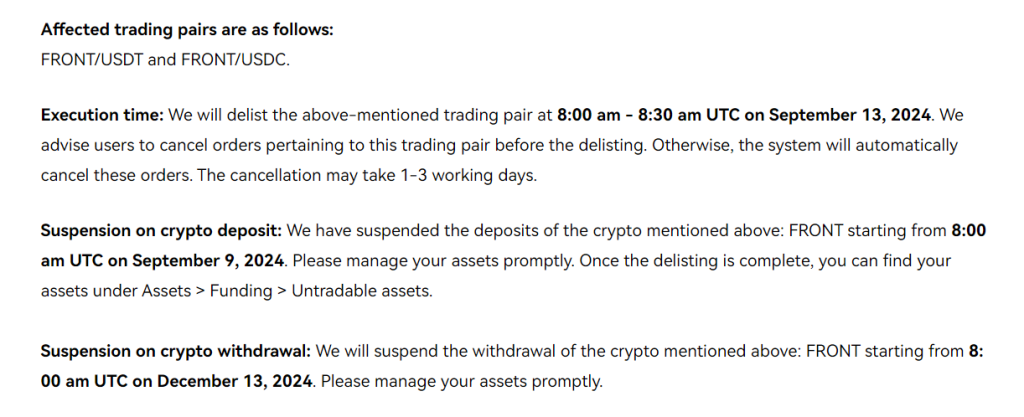Investor Alert! OKX Will Delist This Token

The post Investor Alert! OKX Will Delist This Token appeared first on Coinpedia Fintech News
To safeguard investors and their funds, OKX, the giant cryptocurrency exchange released a report on September 10, 2024, announcing that they will soon delist Frontier (FRONT) token. In a report, they cited that FRONT trading pairs such as FRONT/USDT and FRONT/USDC will no longer be available starting from September 13, 2024.
OKX to Delist Frontier (FRONT)However, they also advised investors and traders to cancel their orders, otherwise the system will automatically cancel them. Additionally, they have already suspended the crypto deposit as of September 9, 2024.
 Source: OKX
Source: OKX
The reason behind the suspension and delisting of Frontier (FRONT) tokens is the rebranding and migration, which the exchange does not support. According to the data, the Frontier (FRONT) token has been rebranded to Self Chain (SLF). Additionally, the project has increased the total token supply from 90,000,000 to 360,000,000 following rebranding.
Reason For Frontier (FRONT) Delist From OKXAnother reason this project has come into the limelight is the exchange of tokens from FRONT to SLF. According to data, while the total supply has increased, the exchange rate is 1 FRONT to 1 SLF token, which has raised concerns among the community about potential fraud. Based on the data, the value held by the users was diluted by 75% related to the total supply.
OKX is the first cryptocurrency to suspend and delist a token potentially due to unfair token distribution. In the report, OKX cited that they will continue to monitor all the listed trading pairs and implement the delisting/hiding mechanism as necessary.
This is not the first time a crypto exchange has delisted any trading pair. We have seen several tokens delisted previously to safeguard investors and their funds.
Current Price MomentumFollowing this report, the renamed token SLF is trading near $0.43 and has experienced a price drop of 2% in the last 24 hours. Meanwhile, its trading volume has also dropped by 17% during the same period, indicating that investors may be losing interest.
